Posted with the permission of @Bman
How to Fix your Sleep
*DISCLAIMER*
I am not a doctor, nor do I have any medical training aside from advanced first aid. In this article, I talk about what has worked for me personally when I was struggling with my sleep after a long period of trial and error.
I highly reccomend doing your own research and if necessary, please consult a physician or medical professional if you are having chronic sleep problems.
I also do not work as a promoter or receive any comission on the products mentioned in this article. These items are simply what I use that work for me.
-----------------------------------------------
Sleep
In 1943, Abraham Maslow proposed the 'Hierarchy of Human Needs' (Kenrick, Griskevicius, Neuburg and Schaller, 2010).
At the very foundation of this hierarchy is the physiological needs that we as Human Beings must attend to throughout our daily lives in order to function at our peak and stay alive.
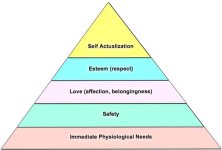
These needs and instincts are hardwired into our DNA, which millions of years of evolution have not yet been able to train out of us:
Food, Air, Sex, Shelter, Water and Sleep.
Lack of sleep has been linked to conditions like obesity, diabetes, heart disease, mental health conditions, and a whole other myriad of health and general wellbeing issues that some have argued is a hidden and highly serious public health concern (Ramar et al., 2021)
Despite this, recent studies conducted by a Gallup Poll have shown that 1 in 3 individuals in the United States are not getting enough sleep, and fail to meet the reccomended 7 hour minimum (Casper-Gallup, 2022).
Bottom line? We all know sleep is important.
Whilst this is a highly important issue in society that needs to be discussed further and addressed, this article is focused on what you can do as an individual to improve your sleep.
Understanding the Circadian Rythym
To understand the science of sleep will hopefully give us some insight into why we might not be sleeping enough or getting poor quality sleep.
Inside our bodies is an internal clock known as the 'Circardian Rythym'. It keeps our body in synchronisation by regulating vital processes, one of these vital and crucial processes is our sleep (Farhud and Aryan, 2018).
The nerve cells in our body directly link our eyes to the brain and in turn, the internal body clock. When our eyes detect light, it signals to our body that it's time to wake up. At the other end of the spectrum, when it gets dark, our eyes signal our brain that it is time to make Melatonin, the 'vampire hormone' (more on this later) which makes us feel sleepy and ready for bed (Kamfar et al., 2024)
Light is the most key component with our Circardian Rythym when it comes to sleep, but other factors can interfere with it such as diet, stress, exercise, medication etc. (Vitaterna, Takahashi and Turek, 2001).
If an individual wants to improve their sleep, then getting the Circardian Rythym back into sync is the key.
Decide on Your Sleep Pattern
This will be different for everyone and will depend on a multitude of factors such as your job, whether you have children, what your life goals are, your hobbies, etc.
There is no right answer as to what 'should' be your bedtime and wakeup time. I do believe however that there is a right answer as to how much sleep you need to get.
As a general rule, human beings require between 7 and 9 hours of sleep per night (Chaput, Dutil and Sampasa-Kanyinga, 2018). The older we get, the less sleep we require. Some people require less and studies have shown genetics can play a factor in this, but it is a rare occurence (Jan, O'Hara and Franken, 2020).
My sweet spot is 8 hours of sleep and yours may be different. I sleep at 21:00 Hrs. and I wake up at 05:00 Hrs. This is what works for my lifestyle and allows me to hit my life goals as well as function properly without looking like a mindless zombie out of a George A. Romero film.
I'm a morning person. I like to get up early and have the house to myself. I enjoy the peace and quiet before everyone else wakes up and starts annoying me.
The early mornings afford me opportunities which I take full advantage of:
My house is peaceful. The roads are quiet. The gym is empty. No-one is around.
One of life's pleasures for me is taking in the morning air in my garden with a cup of coffee as the sun comes up ready to take on the day.
Whilst on the topic, I also get outside and breathe in the fresh air and feel the sun on my face for the first 5 minutes of the day, as this helps me wake up a great deal. It's something I'd reccomend everyone does to get it established that 'I'm awake and ready'.
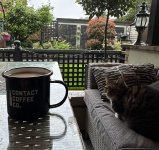
The Hard Sleep Reset
This is an extreme measure which I have done a few times throughout my life to recover from shift work or if I've Fucked my sleep with too many late nights in a row and have been waking up a little too close to 12 o'clock noon for my liking.
The principle is simple: Go to bed at what time you normally do, but wake up no matter what at your new time that you want to start getting up.
Then on the evening time, go to bed at your new time that you want to reset your pattern to, then wake up the next day fresh.
I cannot lie to you, the day that you do this, you will feel like absolute grit. You will quickly realise why the CIA use sleep deprivation as a torture method in Guantanomo Bay or some other Governmet Black Site that I'll probably end up in myself if I discuss it publicly on here.
Exercise
As an office wage slave cubicle cuck, I lead a sedentary lifestyle at work. Exercising during the mornings energises me for my day ahead, but also has the added bonus of making me tired later on in the evening when it's time to sleep.
Even just 30 minutes of some cardio or weights will tire you out. Just make sure not to do any strenous exercise before bed as you'll be as pumped up as Mr. Motivator on Crack.

No Caffeine After Midday
This will just keep you awake. Once 12 o'clock hits, I cut all excess caffeine out of my diet and switch to de-caf or stick with ice water. If you're on the energy drinks, I'd seriously consider cutting these out too. I don't know anybody who drinks Monster or Red Bull and tells me they have a healthy relationship with their sleep.
Sunrise Alarm
In the early days of humanity when we were still fighting each other with sticks and stones over territory, mating partners and scarce resources, the modern alarm clock was still approximately 300,000 years away from being invented.
Early humans had to rely on one of the few certainties in their lives to know when to wake up and when to go to sleep: The sun will come up, and the sun will go down.
This instinct to sleep when the sun goes down and wake up when the sun rises is still present deep within our DNA, despite society's best efforts to train it out of us with shift work, technology and the general consensus of staying up late out of the simple fear of missing out on something.
In light of this (pun intended) One of the best purchases I have ever made that has fixed my sleep has been a sunrise alarm.
At 4:30 a.m, the low glow of the red light starts up from my alarm and gradually over the period of 30 minutes, my room fills with a bright orange light simulating the sun that finally crescendos at 5 a.m with the sound of birdsong.
Sunshine boogie.
My body wakes up fresh, I'm not groggy and I don't (completely) hate the world, loathe my existence and convert to Nihilism as a result.
I use a Phillips Sunrise Alarm, but they do go for around £150. I saw it as an investment, but you can get cheaper versions from eBay, Amazon, or even in some discount stores, although I would imagine you get what you pay for with the less expensive variants.
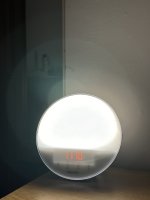
Earplugs
I like to sleep with the window open and let the evening/night air flow into my room, as I struggle to sleep in a warm environment.
Unfortunately for me, I have a main arterial road right next to my place. Aside from the slight decline in property value, the other downside to this is that Cletus the truck driver still has to make his midnight delivery quota as he rolls steadily past in his 18-wheeler.
Chayse the moped rider who doesn't have a job and likes to ride his electric hair dryer engine up and down the same road at 70mph on his repeated early morning McDonald's trips to spend his Government benefit money (my tax dollars hard at work) and try to look cool with his buddies to impress the fit cashier working the graveyard shift unfortunately does not give a Fuck about me trying to sleep.
The solution, you might ask?
Earplugs!
I picked up some Alpine Sleep Deep ones from Frankfurt airport when I had a connecting flight from Krakow (highly recommended as a vacation destination) and I now don't sleep without them.
These work for me as I sleep on my front with my head facing left and they are designed for side sleepers. Any brand will probably do the job for you - again, just have to find what works.
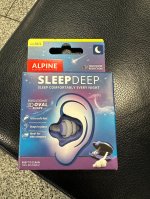
Cut Off Technology...
With every technocological advancement humankind makes, there is inevitably a debt that must be paid. In this case, this is a sleep debt. I'm talking about the object that is currently in your hand that you are likely reading this article on.
We've all stayed up late playing on our phones watching thots twerk on Instagram, or bullshit YouTube shorts and doom-scrolling on Instagram until stupid o'clock in the morning.
We always feel hungover without having to consume alcohol the next day, and our sleep pattern and potentially whole week is wrecked.
Smartphones, or any screen for that matter, emit light which can trick your brain into believeing it is still daytime and you must therefore stay awake. This is known as the 'blue-light' effect, and it can really Fuck with your Circardiac Rythym.
Lots of phones have yellow filters which can offset this, but from my experience, not by much. It's best to just cut the phones (and all screens for that matter) off at least an hour before bedtime. I do 2 hours before, so when 7 P.M rolls around, my phone goes on charge on the other side of my room (outta sight, outta mind). I also put my tablet away.
Anything else to do with my phone or tablet can wait until the morning. Work shouldn't be bothering people out of office hours anyway and if they are and not paying you for it, I'd highly recommend a new job.
... But Also Use it to Your Advantage
One of the features I like on my iPhone is the sleep schedule/bedtime which reminds you to wind down and shut your phone off.
My Apple Watch I wear to bed and it tracks my sleep as well as functioning as a vibrating alarm on my wrist. Combined with the Sunrise Alarm I mentioned previously, I never miss my wakeup anymore.
Technology can be destructive, but if you wield it correctly, you can make it your bitch and it'll work for you instead of against you.
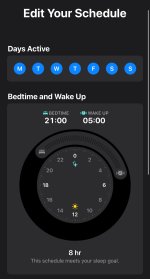
Blackout Blinds/Curtains
In addition to preventing my cougar neighbour from spying on me, the blackout blinds and curtains I've installed also block out any light coming into my room trying to convince my brain that it's still daylight and I need to stay awake.
If installing blinds and curtains is too much of a pain in the ass or expensive, you can get a little kinky instead, and try a blindfold *ahem* 'sleep eye mask'.
Blue Light Blocking Glasses
An hour or so before bed, you can also try wearing blue-light blocking glasses. You can get these on eBay for a couple of bucks. You won't get any points for style or pull any girls wearing them, but they will help your eyes block out both artificial and natural light if it's still light outside or if your family have lights on in the house.
I have an orange pair which I occasionally use and they do the trick:
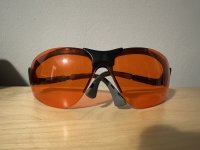
No Meals 2 Hours Before Bed
I used to enjoy a late night meal or snack as much as the next guy, but if you are eating late, it's going to sit on your stomach and your body temperature will rise as the digestive processes kick in.
Then you'll be lying awake staring at the ceiling wondering why you had 7 tacos and ice cream an hour before bedtime. A light snack might be okay, but anything massive I'd start cutting out. I stop eating 2 hours before bed at 7.
Cool Environment
An ideal room temperature for sleeping is between 15 and 20 degrees. Depending on your environment, this might be easy to achieve to nigh-on impossible.
Aside from praying to the weather Gods, do what you can to get the temperature up or down depending on your environment: Aircon, windows, blankets etc. You may have to invest a little into achieveing this, but I've realised that sleep and health are more important than saving a few bucks.
Psychological Dissacosiation: Bed for Sleeping and Sex Only
Time for some psychological warfare.
In my day job which can be stressful, I have a work bag supplied by the company which has my laptop and other gear in. I used to keep it out in the corner of my room and over the weekend or if I was on leave, and It would inevitably catch my eye and I'd start thinking about work.
What I started doing is once I'm home for the weekend or on leave, my bag goes out of the way under my bed so I don't even look at it until the start of the work day.
The result?
I've stopped thinking about work and I enjoy my time off a lot more.
This is just a little personal experience to show how powerful psychological disassociation can be.
The same principle can be applied to sleep and the physical component that is the bed. I only use my bed for sleeping and sex, because I want the psychological association that: Bed = Sleep to be established and strengthened.
I want anything else, such as: Bed = Lying down and Fucking around on my phone for a few hours because I'm bored or whatever, to be completely disassociated from my mind.
If I'm getting into bed now, my mind is saying to me 'I'm here so this means it's time for bed and I'm going to sleep soon...' or if I'm even luckier, I'm getting laid and I'll fall asleep after anyway.
Mattress Topper and Pillow
One thing I realised about mattresses when I was looking to buy a new one is that you will likely have to sell part of yourself to some Eastern-European organ trafficking operation in order to afford one.
I invested in a Mattress Topper which was a hell of a lot cheaper and allowed me to keep all of my organs (bonus) and I got a decent pillow. I bought the Panda brand topper and the Panda pillow. These are both made from memory foam and are incredibly comfortable. They cost about 10% of what a new mattress would when I was pricing them up.
Made from Bamboo plant as well so it seems quite natural and not too bad for the environment if you care about that kinda thing.
I feel like I am indeed sleeping on a cuddly Panda without the worry of getting mauled to death by one, so it's a win-win. I bought mine direct from Panda, but they do sell through other retailers which you may be able to find cheaper.
The reviews are excellent, they've worked well for me and people I spoke to who own these items swear by them.

Melatonin
Melatonin supplements have been a complete game-changer for me.
It is produced naturally by the body, and is known as the 'vampire hormone' as it only comes at night (there's a joke in there somewhere, but I'm not gonna make it).
You can buy Melatonin either on prescription from an online doctor/pharmacy for jetlag, or just over the counter. Where I live, it is prescription only and expensive, so I make sure to stock up when I'm doing a tobacco run for my dad across the border into Eastern Europe, where I pay 4x as less and don't have to get a doctor's prescription.
You can get various strengths of roughly 2-5mg so if you are going to try using it, I'd start off low and slow then up as needed 1 hour before bed and 2 hours after food.
Your body can get acclimatised to the stuff, so I don't take it all the time. I take breaks in between doses.
Again, I'm not a doctor, so please do your own research or consult one as well as checking your local laws on Melatonin use.
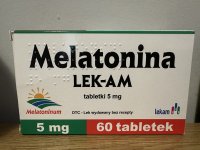
CBD
CBD or Cannabinadol is from the cannabis plant, but contains no THC (pity) or rather, a very low trace amount. In theory, it works by binding to the pain receptors in the body and studies have shown that it can help relieve the symptoms of anxiety and stress.
I take it in gummy form and it is purely a complimentary supplement which I'll have in the late afternoon to help chill me out a bit. It does help me personally, but reviews are mixed, so I'd see it as a luxury and not a necessity. CBD Guru has the best prices I've found and often do buy one get one free sales.

Typically used for muscle pain, Magnesium is also beneficial for sleep. As well as pills, you can also get it in a cream/gel form to rub into aching muscles and it has been reported to help those struggling with sleep.
I get mine from multivitamins, but you can buy it on its own from any health food or supplement store.
Prayer/Meditation
In the hour or 2 before I go to bed, I reflect on my day and pray. I class myself as a Catholic now having recently converted from being an atheist and I find that this helps declutter my mind.
If religion isn't your thing, then meditation is also highly beneficial. Just sitting down and thinking about the day to unwind and then clearing the mind of anything troubling you will do wonders for your sleep.
Chill Mixtape
I have a Sony Walkman because I'm old-school and anti-subscription. I have a chill mixtape on it that I put on of an evening with mostly Oneheart and other relaxing artists.
I'd ditch the Doom Soundtrack and Slayer or rap/drum and bass etc. and save it for the gym, as you'll be up all night otherwise.
Journaling/Reading
Journaling or reading a book is ideal for unwinding. I do both of an evening and it relaxes my mind. Wouldn't choose anything too heavy to read, as you can easily fall into the trap of staying up late to finish a particularly thrilling chapter or even the whole book - been there done that.
Get a Professional Massage
I recently had one from a Thai/Bali place in Krakow and I had one of the best sleeps of my life after. This might just do the trick to help you get an early night and reset your sleep.
Mental Health/Brain Chatter
As someone who has struggled with PTSD, Anxiety and Depression over the years, I understand the impact that this can have on sleep.
I've spent many a night lying awake in bed staring at the ceiling with things on my mind.
Passion Flower has shown to be effective at helping with 'brain chatter' and is a natural herb/remedy. It did not do the job for me, as there were underlying issues, but I know people it has helped.
If the above activities don't work, it may be time to seek some professional help. There's no shame in it and I wish I would have asked for help a lot sooner. CBT and medication has worked wonders for me and cured a lot of the underlying issues that were affecting my sleep.
Some workplaces even offer it free as part of employee assistance and health insurance companies or socialised healthcare - speak to your H.R department or healthcare provider.
Don't suffer in silence for so long like I did. It's okay to speak to your doctor or a therapist and ask for help and it certainly doesn't make you any less of a man, no matter what some TikTok influencer says.
It's a genuine medical issue and not because you're weak or whatever.
Author: Spider Jerusalem
Source List:
Kenrick, D.T., Griskevicius, V., Neuberg, S.L., and Schaller, M. (2011) Renovating the Pyramid of Needs: Contemporary Extensions Built Upon Ancient Foundations. Perspectives on Psychological Science [online]. 5(3), pp. 292-314. [Accessed 28 July, 2024). Available at: <https://www.ncbi.nlm.nih.gov/pmc/articles/PMC3161123/>.
Ramar, K., Malhotra, R.K., Carden, K.A., Martin, J.L., Abbasi-Feinberg, F., Aurora, N.R., Kapur, V.K., Olson, E.J., Rosen, C.L., Rowley, J.A., Shelgikar, A.V., Trottie, L.M. (2021) Sleep is esential to health: an American Academy of Sleep Medicine position statement. Journal of Clinical Sleep Medicine [online]. 17(10), pp.2115-2119. [Accessed 28 July, 2024]. Available at: <https://jcsm.aasm.org/doi/10.5664/jcsm.9476>.
Gallup-Casper (2022) The State of Sleep in America [online]. [Accessed 28 July, 2024]. Available at: <https://www.gallup.com/analytics/390536/sleep-in-america-2022.aspx>.
Farhud, D. and Aryan, Z. (2018) Circardian Rythym, Lifestyle and Health: A Narrative Review. Iranian Journal of Public Health [online]. 47(8), pp.1068-1076. [Accessed 28 July, 2024]. Available at: <https://www.ncbi.nlm.nih.gov/pmc/articles/PMC6123576/>.
Kamfar, W.W., Khraiwesh, H.M., Ibrahim, M.O., Qadhi, A.H., Azhar, W.F., Ghafouri, K.J., Alhussain, M.H., Aldairi, A.F., AlShahrani, A.M., Alghannam, A.F., Abdulal, R.H., Al-Slaihat, A.H., Qutob, M.S., Elrggal, M.E., Ghaith, M.M. and Azzeh, F.S. (2024) Comprehensive review of melatonin as a promising nutritional and nutraceuitcal supplement. Heliyon [online]. 10(2), pp. 1-11. [Accessed 28 July, 2024]. Available at: <https://www.sciencedirect.com/science/article/pii/S2405844024002974>.
Vitaterna, M.H., Takahashi, J.S. and Turek, F.W. (2001) Overview of Circadian Rythyms. Alcohol Research and Health [online]. 25(2), pp.85-93. [Accessed 28 July, 2024]. Available at: <https://www.ncbi.nlm.nih.gov/pmc/articles/PMC6707128/>.
Chaput, J.P., Dutil, C. and Sampasa-Kanyinga, H. (2018) Sleeping hours: what is the ideal number and how does age impact this? Nature and Science of Sleep [online]. 1(10), pp.421-430. [Accessed 28 July, 2024]. Available at: <https://www.ncbi.nlm.nih.gov/pmc/articles/PMC6267703/>.
Jan, M., O'Hara, B.F. and Franken, P. (2020) Recent advances in understanding the genetics of sleep. F1000Res [online]. 1(9), pp.1-11. [Accessed 28 July, 2024]. Available at: <https://www.ncbi.nlm.nih.gov/pmc/articles/PMC7104869/>.
How to Fix your Sleep 
*DISCLAIMER*
I am not a doctor, nor do I have any medical training aside from advanced first aid. In this article, I talk about what has worked for me personally when I was struggling with my sleep after a long period of trial and error.
I highly reccomend doing your own research and if necessary, please consult a physician or medical professional if you are having chronic sleep problems.
I also do not work as a promoter or receive any comission on the products mentioned in this article. These items are simply what I use that work for me.
-----------------------------------------------
Sleep
In 1943, Abraham Maslow proposed the 'Hierarchy of Human Needs' (Kenrick, Griskevicius, Neuburg and Schaller, 2010).
At the very foundation of this hierarchy is the physiological needs that we as Human Beings must attend to throughout our daily lives in order to function at our peak and stay alive.

These needs and instincts are hardwired into our DNA, which millions of years of evolution have not yet been able to train out of us:
Food, Air, Sex, Shelter, Water and Sleep.
Lack of sleep has been linked to conditions like obesity, diabetes, heart disease, mental health conditions, and a whole other myriad of health and general wellbeing issues that some have argued is a hidden and highly serious public health concern (Ramar et al., 2021)
Despite this, recent studies conducted by a Gallup Poll have shown that 1 in 3 individuals in the United States are not getting enough sleep, and fail to meet the reccomended 7 hour minimum (Casper-Gallup, 2022).
Bottom line? We all know sleep is important.
Whilst this is a highly important issue in society that needs to be discussed further and addressed, this article is focused on what you can do as an individual to improve your sleep.
Understanding the Circadian Rythym
To understand the science of sleep will hopefully give us some insight into why we might not be sleeping enough or getting poor quality sleep.
Inside our bodies is an internal clock known as the 'Circardian Rythym'. It keeps our body in synchronisation by regulating vital processes, one of these vital and crucial processes is our sleep (Farhud and Aryan, 2018).
The nerve cells in our body directly link our eyes to the brain and in turn, the internal body clock. When our eyes detect light, it signals to our body that it's time to wake up. At the other end of the spectrum, when it gets dark, our eyes signal our brain that it is time to make Melatonin, the 'vampire hormone' (more on this later) which makes us feel sleepy and ready for bed (Kamfar et al., 2024)
Light is the most key component with our Circardian Rythym when it comes to sleep, but other factors can interfere with it such as diet, stress, exercise, medication etc. (Vitaterna, Takahashi and Turek, 2001).
If an individual wants to improve their sleep, then getting the Circardian Rythym back into sync is the key.
Decide on Your Sleep Pattern
This will be different for everyone and will depend on a multitude of factors such as your job, whether you have children, what your life goals are, your hobbies, etc.
There is no right answer as to what 'should' be your bedtime and wakeup time. I do believe however that there is a right answer as to how much sleep you need to get.
As a general rule, human beings require between 7 and 9 hours of sleep per night (Chaput, Dutil and Sampasa-Kanyinga, 2018). The older we get, the less sleep we require. Some people require less and studies have shown genetics can play a factor in this, but it is a rare occurence (Jan, O'Hara and Franken, 2020).
My sweet spot is 8 hours of sleep and yours may be different. I sleep at 21:00 Hrs. and I wake up at 05:00 Hrs. This is what works for my lifestyle and allows me to hit my life goals as well as function properly without looking like a mindless zombie out of a George A. Romero film.
I'm a morning person. I like to get up early and have the house to myself. I enjoy the peace and quiet before everyone else wakes up and starts annoying me.
The early mornings afford me opportunities which I take full advantage of:
My house is peaceful. The roads are quiet. The gym is empty. No-one is around.
One of life's pleasures for me is taking in the morning air in my garden with a cup of coffee as the sun comes up ready to take on the day.
Whilst on the topic, I also get outside and breathe in the fresh air and feel the sun on my face for the first 5 minutes of the day, as this helps me wake up a great deal. It's something I'd reccomend everyone does to get it established that 'I'm awake and ready'.

The Hard Sleep Reset
This is an extreme measure which I have done a few times throughout my life to recover from shift work or if I've Fucked my sleep with too many late nights in a row and have been waking up a little too close to 12 o'clock noon for my liking.
The principle is simple: Go to bed at what time you normally do, but wake up no matter what at your new time that you want to start getting up.
Then on the evening time, go to bed at your new time that you want to reset your pattern to, then wake up the next day fresh.
I cannot lie to you, the day that you do this, you will feel like absolute grit. You will quickly realise why the CIA use sleep deprivation as a torture method in Guantanomo Bay or some other Governmet Black Site that I'll probably end up in myself if I discuss it publicly on here.
Exercise
As an office wage slave cubicle cuck, I lead a sedentary lifestyle at work. Exercising during the mornings energises me for my day ahead, but also has the added bonus of making me tired later on in the evening when it's time to sleep.
Even just 30 minutes of some cardio or weights will tire you out. Just make sure not to do any strenous exercise before bed as you'll be as pumped up as Mr. Motivator on Crack.

No Caffeine After Midday
This will just keep you awake. Once 12 o'clock hits, I cut all excess caffeine out of my diet and switch to de-caf or stick with ice water. If you're on the energy drinks, I'd seriously consider cutting these out too. I don't know anybody who drinks Monster or Red Bull and tells me they have a healthy relationship with their sleep.
Sunrise Alarm
In the early days of humanity when we were still fighting each other with sticks and stones over territory, mating partners and scarce resources, the modern alarm clock was still approximately 300,000 years away from being invented.
Early humans had to rely on one of the few certainties in their lives to know when to wake up and when to go to sleep: The sun will come up, and the sun will go down.
This instinct to sleep when the sun goes down and wake up when the sun rises is still present deep within our DNA, despite society's best efforts to train it out of us with shift work, technology and the general consensus of staying up late out of the simple fear of missing out on something.
In light of this (pun intended) One of the best purchases I have ever made that has fixed my sleep has been a sunrise alarm.
At 4:30 a.m, the low glow of the red light starts up from my alarm and gradually over the period of 30 minutes, my room fills with a bright orange light simulating the sun that finally crescendos at 5 a.m with the sound of birdsong.
Sunshine boogie.
My body wakes up fresh, I'm not groggy and I don't (completely) hate the world, loathe my existence and convert to Nihilism as a result.
I use a Phillips Sunrise Alarm, but they do go for around £150. I saw it as an investment, but you can get cheaper versions from eBay, Amazon, or even in some discount stores, although I would imagine you get what you pay for with the less expensive variants.

Earplugs
I like to sleep with the window open and let the evening/night air flow into my room, as I struggle to sleep in a warm environment.
Unfortunately for me, I have a main arterial road right next to my place. Aside from the slight decline in property value, the other downside to this is that Cletus the truck driver still has to make his midnight delivery quota as he rolls steadily past in his 18-wheeler.
Chayse the moped rider who doesn't have a job and likes to ride his electric hair dryer engine up and down the same road at 70mph on his repeated early morning McDonald's trips to spend his Government benefit money (my tax dollars hard at work) and try to look cool with his buddies to impress the fit cashier working the graveyard shift unfortunately does not give a Fuck about me trying to sleep.
The solution, you might ask?
Earplugs!
I picked up some Alpine Sleep Deep ones from Frankfurt airport when I had a connecting flight from Krakow (highly recommended as a vacation destination) and I now don't sleep without them.
These work for me as I sleep on my front with my head facing left and they are designed for side sleepers. Any brand will probably do the job for you - again, just have to find what works.

Cut Off Technology...
With every technocological advancement humankind makes, there is inevitably a debt that must be paid. In this case, this is a sleep debt. I'm talking about the object that is currently in your hand that you are likely reading this article on.
We've all stayed up late playing on our phones watching thots twerk on Instagram, or bullshit YouTube shorts and doom-scrolling on Instagram until stupid o'clock in the morning.
We always feel hungover without having to consume alcohol the next day, and our sleep pattern and potentially whole week is wrecked.
Smartphones, or any screen for that matter, emit light which can trick your brain into believeing it is still daytime and you must therefore stay awake. This is known as the 'blue-light' effect, and it can really Fuck with your Circardiac Rythym.
Lots of phones have yellow filters which can offset this, but from my experience, not by much. It's best to just cut the phones (and all screens for that matter) off at least an hour before bedtime. I do 2 hours before, so when 7 P.M rolls around, my phone goes on charge on the other side of my room (outta sight, outta mind). I also put my tablet away.
Anything else to do with my phone or tablet can wait until the morning. Work shouldn't be bothering people out of office hours anyway and if they are and not paying you for it, I'd highly recommend a new job.
... But Also Use it to Your Advantage
One of the features I like on my iPhone is the sleep schedule/bedtime which reminds you to wind down and shut your phone off.
My Apple Watch I wear to bed and it tracks my sleep as well as functioning as a vibrating alarm on my wrist. Combined with the Sunrise Alarm I mentioned previously, I never miss my wakeup anymore.
Technology can be destructive, but if you wield it correctly, you can make it your bitch and it'll work for you instead of against you.

Blackout Blinds/Curtains
In addition to preventing my cougar neighbour from spying on me, the blackout blinds and curtains I've installed also block out any light coming into my room trying to convince my brain that it's still daylight and I need to stay awake.
If installing blinds and curtains is too much of a pain in the ass or expensive, you can get a little kinky instead, and try a blindfold *ahem* 'sleep eye mask'.
Blue Light Blocking Glasses
An hour or so before bed, you can also try wearing blue-light blocking glasses. You can get these on eBay for a couple of bucks. You won't get any points for style or pull any girls wearing them, but they will help your eyes block out both artificial and natural light if it's still light outside or if your family have lights on in the house.
I have an orange pair which I occasionally use and they do the trick:

No Meals 2 Hours Before Bed
I used to enjoy a late night meal or snack as much as the next guy, but if you are eating late, it's going to sit on your stomach and your body temperature will rise as the digestive processes kick in.
Then you'll be lying awake staring at the ceiling wondering why you had 7 tacos and ice cream an hour before bedtime. A light snack might be okay, but anything massive I'd start cutting out. I stop eating 2 hours before bed at 7.
Cool Environment
An ideal room temperature for sleeping is between 15 and 20 degrees. Depending on your environment, this might be easy to achieve to nigh-on impossible.
Aside from praying to the weather Gods, do what you can to get the temperature up or down depending on your environment: Aircon, windows, blankets etc. You may have to invest a little into achieveing this, but I've realised that sleep and health are more important than saving a few bucks.
Psychological Dissacosiation: Bed for Sleeping and Sex Only
Time for some psychological warfare.
In my day job which can be stressful, I have a work bag supplied by the company which has my laptop and other gear in. I used to keep it out in the corner of my room and over the weekend or if I was on leave, and It would inevitably catch my eye and I'd start thinking about work.
What I started doing is once I'm home for the weekend or on leave, my bag goes out of the way under my bed so I don't even look at it until the start of the work day.
The result?
I've stopped thinking about work and I enjoy my time off a lot more.
This is just a little personal experience to show how powerful psychological disassociation can be.
The same principle can be applied to sleep and the physical component that is the bed. I only use my bed for sleeping and sex, because I want the psychological association that: Bed = Sleep to be established and strengthened.
I want anything else, such as: Bed = Lying down and Fucking around on my phone for a few hours because I'm bored or whatever, to be completely disassociated from my mind.
If I'm getting into bed now, my mind is saying to me 'I'm here so this means it's time for bed and I'm going to sleep soon...' or if I'm even luckier, I'm getting laid and I'll fall asleep after anyway.
Mattress Topper and Pillow
One thing I realised about mattresses when I was looking to buy a new one is that you will likely have to sell part of yourself to some Eastern-European organ trafficking operation in order to afford one.
I invested in a Mattress Topper which was a hell of a lot cheaper and allowed me to keep all of my organs (bonus) and I got a decent pillow. I bought the Panda brand topper and the Panda pillow. These are both made from memory foam and are incredibly comfortable. They cost about 10% of what a new mattress would when I was pricing them up.
Made from Bamboo plant as well so it seems quite natural and not too bad for the environment if you care about that kinda thing.
I feel like I am indeed sleeping on a cuddly Panda without the worry of getting mauled to death by one, so it's a win-win. I bought mine direct from Panda, but they do sell through other retailers which you may be able to find cheaper.
The reviews are excellent, they've worked well for me and people I spoke to who own these items swear by them.

Melatonin
Melatonin supplements have been a complete game-changer for me.
It is produced naturally by the body, and is known as the 'vampire hormone' as it only comes at night (there's a joke in there somewhere, but I'm not gonna make it).
You can buy Melatonin either on prescription from an online doctor/pharmacy for jetlag, or just over the counter. Where I live, it is prescription only and expensive, so I make sure to stock up when I'm doing a tobacco run for my dad across the border into Eastern Europe, where I pay 4x as less and don't have to get a doctor's prescription.
You can get various strengths of roughly 2-5mg so if you are going to try using it, I'd start off low and slow then up as needed 1 hour before bed and 2 hours after food.
Your body can get acclimatised to the stuff, so I don't take it all the time. I take breaks in between doses.
Again, I'm not a doctor, so please do your own research or consult one as well as checking your local laws on Melatonin use.

CBD
CBD or Cannabinadol is from the cannabis plant, but contains no THC (pity) or rather, a very low trace amount. In theory, it works by binding to the pain receptors in the body and studies have shown that it can help relieve the symptoms of anxiety and stress.
I take it in gummy form and it is purely a complimentary supplement which I'll have in the late afternoon to help chill me out a bit. It does help me personally, but reviews are mixed, so I'd see it as a luxury and not a necessity. CBD Guru has the best prices I've found and often do buy one get one free sales.

Typically used for muscle pain, Magnesium is also beneficial for sleep. As well as pills, you can also get it in a cream/gel form to rub into aching muscles and it has been reported to help those struggling with sleep.
I get mine from multivitamins, but you can buy it on its own from any health food or supplement store.
Prayer/Meditation
In the hour or 2 before I go to bed, I reflect on my day and pray. I class myself as a Catholic now having recently converted from being an atheist and I find that this helps declutter my mind.
If religion isn't your thing, then meditation is also highly beneficial. Just sitting down and thinking about the day to unwind and then clearing the mind of anything troubling you will do wonders for your sleep.
Chill Mixtape
I have a Sony Walkman because I'm old-school and anti-subscription. I have a chill mixtape on it that I put on of an evening with mostly Oneheart and other relaxing artists.
I'd ditch the Doom Soundtrack and Slayer or rap/drum and bass etc. and save it for the gym, as you'll be up all night otherwise.
Journaling/Reading
Journaling or reading a book is ideal for unwinding. I do both of an evening and it relaxes my mind. Wouldn't choose anything too heavy to read, as you can easily fall into the trap of staying up late to finish a particularly thrilling chapter or even the whole book - been there done that.
Get a Professional Massage
I recently had one from a Thai/Bali place in Krakow and I had one of the best sleeps of my life after. This might just do the trick to help you get an early night and reset your sleep.
Mental Health/Brain Chatter
As someone who has struggled with PTSD, Anxiety and Depression over the years, I understand the impact that this can have on sleep.
I've spent many a night lying awake in bed staring at the ceiling with things on my mind.
Passion Flower has shown to be effective at helping with 'brain chatter' and is a natural herb/remedy. It did not do the job for me, as there were underlying issues, but I know people it has helped.
If the above activities don't work, it may be time to seek some professional help. There's no shame in it and I wish I would have asked for help a lot sooner. CBT and medication has worked wonders for me and cured a lot of the underlying issues that were affecting my sleep.
Some workplaces even offer it free as part of employee assistance and health insurance companies or socialised healthcare - speak to your H.R department or healthcare provider.
Don't suffer in silence for so long like I did. It's okay to speak to your doctor or a therapist and ask for help and it certainly doesn't make you any less of a man, no matter what some TikTok influencer says.
It's a genuine medical issue and not because you're weak or whatever.
Author: Spider Jerusalem
Source List:
Kenrick, D.T., Griskevicius, V., Neuberg, S.L., and Schaller, M. (2011) Renovating the Pyramid of Needs: Contemporary Extensions Built Upon Ancient Foundations. Perspectives on Psychological Science [online]. 5(3), pp. 292-314. [Accessed 28 July, 2024). Available at: <https://www.ncbi.nlm.nih.gov/pmc/articles/PMC3161123/>.
Ramar, K., Malhotra, R.K., Carden, K.A., Martin, J.L., Abbasi-Feinberg, F., Aurora, N.R., Kapur, V.K., Olson, E.J., Rosen, C.L., Rowley, J.A., Shelgikar, A.V., Trottie, L.M. (2021) Sleep is esential to health: an American Academy of Sleep Medicine position statement. Journal of Clinical Sleep Medicine [online]. 17(10), pp.2115-2119. [Accessed 28 July, 2024]. Available at: <https://jcsm.aasm.org/doi/10.5664/jcsm.9476>.
Gallup-Casper (2022) The State of Sleep in America [online]. [Accessed 28 July, 2024]. Available at: <https://www.gallup.com/analytics/390536/sleep-in-america-2022.aspx>.
Farhud, D. and Aryan, Z. (2018) Circardian Rythym, Lifestyle and Health: A Narrative Review. Iranian Journal of Public Health [online]. 47(8), pp.1068-1076. [Accessed 28 July, 2024]. Available at: <https://www.ncbi.nlm.nih.gov/pmc/articles/PMC6123576/>.
Kamfar, W.W., Khraiwesh, H.M., Ibrahim, M.O., Qadhi, A.H., Azhar, W.F., Ghafouri, K.J., Alhussain, M.H., Aldairi, A.F., AlShahrani, A.M., Alghannam, A.F., Abdulal, R.H., Al-Slaihat, A.H., Qutob, M.S., Elrggal, M.E., Ghaith, M.M. and Azzeh, F.S. (2024) Comprehensive review of melatonin as a promising nutritional and nutraceuitcal supplement. Heliyon [online]. 10(2), pp. 1-11. [Accessed 28 July, 2024]. Available at: <https://www.sciencedirect.com/science/article/pii/S2405844024002974>.
Vitaterna, M.H., Takahashi, J.S. and Turek, F.W. (2001) Overview of Circadian Rythyms. Alcohol Research and Health [online]. 25(2), pp.85-93. [Accessed 28 July, 2024]. Available at: <https://www.ncbi.nlm.nih.gov/pmc/articles/PMC6707128/>.
Chaput, J.P., Dutil, C. and Sampasa-Kanyinga, H. (2018) Sleeping hours: what is the ideal number and how does age impact this? Nature and Science of Sleep [online]. 1(10), pp.421-430. [Accessed 28 July, 2024]. Available at: <https://www.ncbi.nlm.nih.gov/pmc/articles/PMC6267703/>.
Jan, M., O'Hara, B.F. and Franken, P. (2020) Recent advances in understanding the genetics of sleep. F1000Res [online]. 1(9), pp.1-11. [Accessed 28 July, 2024]. Available at: <https://www.ncbi.nlm.nih.gov/pmc/articles/PMC7104869/>.
